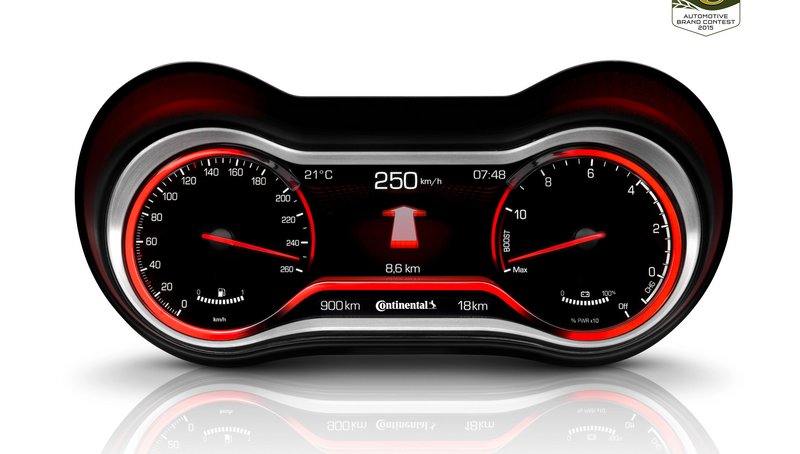Design Prize: German Design Council Awards Continental Hybrid Instrument Cluster with "Best of Best" Award
- Hybrid Instrument Cluster points to the future of the instrument cluster
- The best of both display worlds combined: analog and digital
- Design of the vehicle–driver interface becoming increasingly important
Babenhausen, August 24, 2015. The German Design Council awards Continental's Hybrid Instrument Cluster with the "Best of Best" award in the Automotive Brand Contest 2015. This German Design Council award honors the outstanding achievements of the design team in the automotive industry's product and communication design sectors. The team receives the award for its contribution to the future of the instrument cluster in the car. The award will be presented during the International Motor Show (IAA) in Frankfurt on September 15, 2015.
"With the optical three-dimensional structure and the associated virtual combination of digital and analog worlds, the Continental designers are not only setting innovative esthetic standards, but they are also offering their cockpit design colleagues completely new design possibilities," says jury member Prof. Andrea Lipp, explaining why the Continental Hybrid Cluster merited the "Best of Best" award.
"In our Hybrid Instrument Cluster, we combine a three-dimensional tinted glass-look surface with traditional analog indicators," explains qualified designer Jochen Möller, who is responsible for the product design. Along with the analog instrument dials, the high-quality seven-inch AMOLED display integrates seamlessly and with no visible edges into the 'black panel' surface of the instrument cluster, says Möller. Pixels from OLED displays emit lights themselves unlike LCD/TFT displays. Black-activated pixels therefore do not emit any light and are thus actually black ('active black panel'). This results in a higher contrast and invisible transitions between the display and the adjoining surface. "The display content appears to be floating in the black space." However, the indicators have deliberately been kept classically analog, so that the quality and three-dimensionality retain their character.
The hybrid principle thus runs through the entire design. Circumferential LED optical fibers, which can emit light in a wide variety of colors, ensure striking ambient lighting. However, the light strip can simultaneously supply the driver with important additional information. Möller gives an example: "If another vehicle overtakes, the driver is notified by means of partial illumination or color changes in the LED strip without having to look to the side." The integrated display can show any kind of information – from infotainment and navigation to warnings. The useful display surface in this design is not trimmed with tubes. The indicators, dials, and display are so precisely coordinated that they allow the available display surface to be adapted to the situation and used optimally. For example, the analog indicators interact with the display with the printed tube dials switching seamlessly to digital as required.
With the Automotive Brand Contest, the German Design Council recognizes outstanding product and communication design, steering attention toward the fundamental importance of brands and brand design in the automotive industry. The focus here is on the holistic and consistent depiction of the brand across all media and products. The competition is the only neutral, international design competition for automotive brands and, within a very short space of time, it has evolved into one of the world's most important industry competitions. The Automotive Brand Contest provides companies in the automotive industry and their partners in the supply, design, and brand communications industries with a platform to compare their achievements and position themselves on an international level.
The Hybrid Instrument Cluster at a glance
- Seamless 3D black panel surface (tinted, deep-drawn with homogeneous light transmission)
- Active black panel effect thanks to the AMOLED properties, which give the instrument dials and the display an identical appearance
- Seamless transition between analog and digital modes
- Display image with innovative "levels" effect on a three-dimensional surface
- Dynamic indicator interaction with the display
- Optimum utilization of the display space

Ilona Tzudnowski
Media Spokesperson Software Architecture and Network Solutions
Continental Automotive
